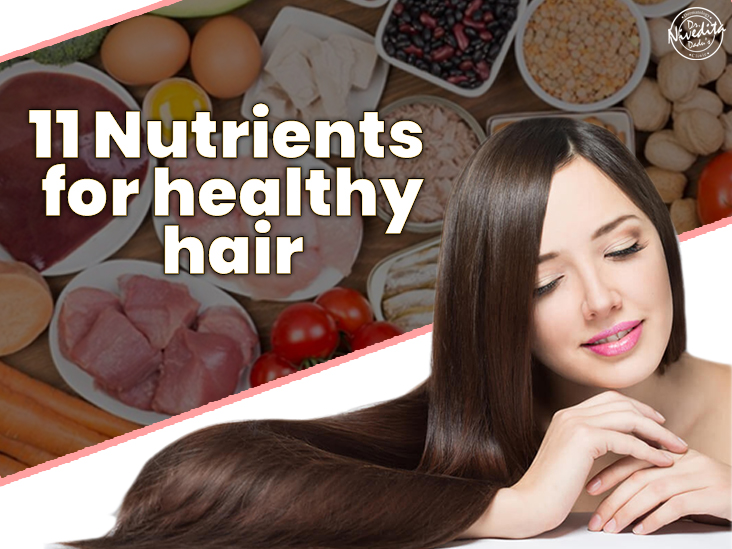Diet plays a very important role in keeping the hair and skin healthy. The foods we consume have a great impact on the growth, strength, and volume of our hair.
The fact that we all tend to forget is that hair grows from roots, so to keep hair healthy it is important to focus on scalp health and hair follicles.
How does diet impact hair growth?
Certain nutrients can support and improve hair growth.
Hair grows continuously and is replaced and the follicles are constantly creating new hairs. The foods people eat affect the hair growth and its quality. Certain proteins, fats, vitamins, and minerals are especially important for strong, healthy hair. Eating a varied, nutritious diet can also boost nail and skin health. The changes will be most noticeable in people who previously had vitamin or nutrient deficiencies. Even so, it may take a while to see the positive results, in terms of hair growth.
What factors affect hair growth?
As people age, they may notice that their hair does not grow as quickly as before and that it is less thick. Some follicles may stop producing new hairs, leading to hair thinning or loss. This results from a combination of genetics and natural aging processes. Childbirth, stress, thyroid conditions, and a health conditions like alopecia can cause more sudden loss of hair. Eating a healthy diet, catered to improve your hair growth, may not address genetic or systemic problems. Malnutrition is most common cause of hair fall. Following a healthy, well-balanced diet can help people maintain ideal levels of hair growth and replacement.
Nutritious eating can also help prevent these signs of unhealthy or damaged hair: dryness, brittle texture, dull appearance, tendency to break easily.
The following is a list of foods and nutrients which should be incorporated in your diet to promote hair growth.
-
Proteins and amino acids: Certain amino acids in protein-rich foods may help promote hair growth, and L-lysine is one example. L-lysine is also present in the hair's root, and it is responsible for the shape and volume of the hair. An L-lysine deficiency can cause hair loss, but getting enough of this amino acid can prevent this issue and promote regular hair growth. People can take L-lysine supplements. It also exists, as dietary protein, in foods like meat, eggs, beans, lentils and nuts
-
OMEGA 3 Fatty acids: Not all fat is bad for body, fats are an important part of every diet, and omega-3 fatty acids are good for the heart as well as the hair, skin, and eyes. Fish can be good sources of omega-3s as well as vitamin D, which can boost hair health. People who follow a vegetarian or vegan diet can get omega-3s from the following plant-based sources: walnuts, seeds such as flaxseeds and chia seeds, flaxseed oil, soybean oil, and canola oil and fortified foods
-
Foods rich in biotin: Thinning hair and a loss of body hair are two symptoms of a biotin deficiency. Many dietary supplements for hair growth contain biotin. Eggs are a very good source of biotin. Other foods that contain biotin: meat, including fish, nuts, seeds, some vegetables, such as sweet potatoes, spinach, and broccoli. Eggs also contain other compounds that can boost hair growth, including L-lysine, vitamin D, and certain minerals.
-
Foods rich in selenium include: Nuts, meat (liver and fish), eggs, milk and other dairy products, breads and cereals
-
Iron deficiency is one of the common causes of hair loss. Iron-rich foods fall into two categories – iron derived from meat is known as heme iron and iron consumed from plants is known as non-heme iron. Heme iron is derived from animal protein, which includes beef, poultry, seafood, and fish. Heme iron is more readily absorbed into the body. Non-heme iron is derived from plant-based sources, which includes foods like grains, beans, legumes, vegetables, fruits, nuts, and seeds. Non-heme iron can also be found in dairy and eggs. Iron Rich Foods for Optimal Hair Growth: Avocados, Apricots, Baked potatoes, Beans, Beetroot, Broccoli, Dairy products, Dark chocolate, Eggs, Guava, Lamb, Lean Meat, Lentils, Nuts, Pumpkins, Pumpkin seeds, Raisins, Soybeans, Sunflower seeds, Sweet Potatoes, Spinach.
-
Foods rich in potent antioxidants like Vitamin C can help in maintaining healthy hair. Good sources of vitamin C are kiwi, citrus fruits, pineapple, tomatoes, green peppers, and dark green vegetables. The antioxidant can help increase scalp circulation and this is crucial for hair growth. Vitamin E is also important for blood circulation and oxygenation. You get it from foods like leafy green vegetables, dried beans, soybeans, raw seeds and nuts. Diets deficient in vitamin A may lead to hair loss. While it's important to get enough vitamin A, too much may be dangerous Sweet potatoes, carrots, pumpkins, spinach are all high in beta-carotene, which is turned into vitamin A. Vitamin A can also be found in animal products such as milk, eggs and yogurt.
-
Foods rich in zinc: Zinc plays an important role in hair tissue growth and repair. It also helps keep the oil glands around the follicles working properly. Zinc deficiency can also lead to hair loss problem. Researches have shown that consumption of zinc supplements tend to reduce hair loss caused by zinc deficiency. However, there are some anecdotal reports that supplementing with too high of a dose can also contribute to hair loss. So Zinc consumption is important for all of us. Foods high in zinc include oysters, spinach, wheat germ, pumpkin seeds and lentils.
At the end of the day, the best way to get these nutrients is by eating a balanced, real food-based diet that includes plenty of nutrient-dense foods.
Always consult your dermatologist to get the best advice
Keep Healthy Keep Glowing!

